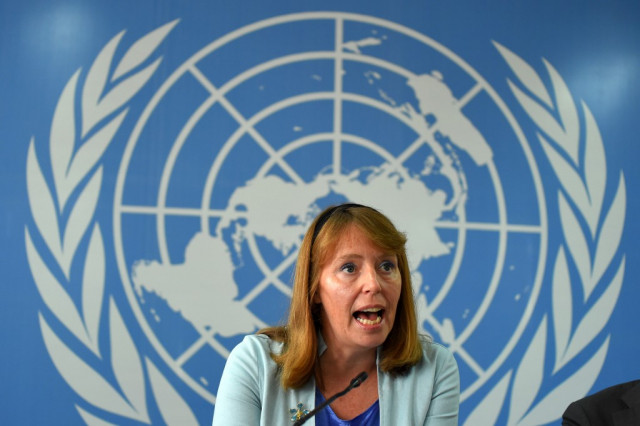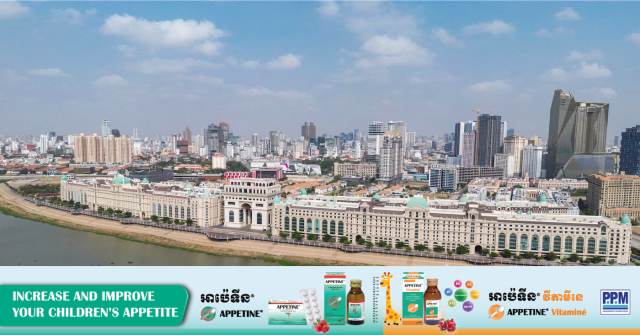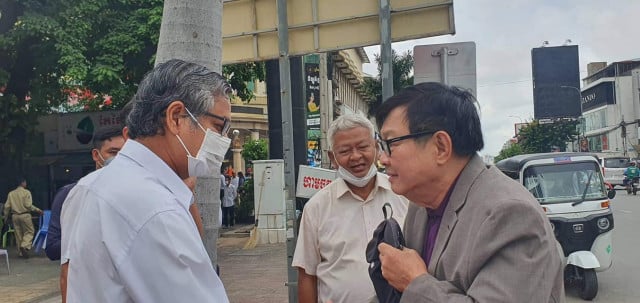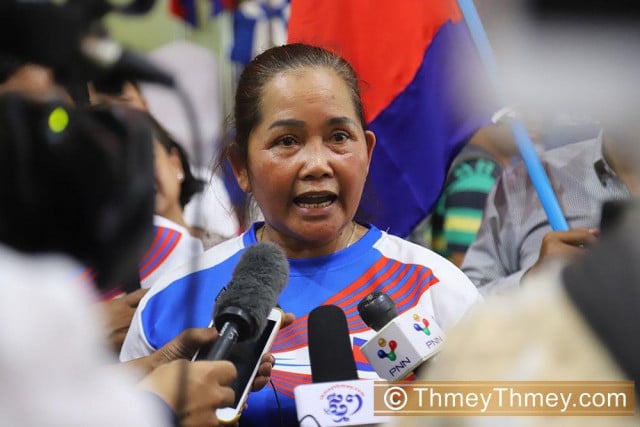Litany of Rights Abuses in Cambodia Reported to the UN Human Rights Council

- Gerald Flynn and Phuong Vantha
- October 3, 2020 3:19 AM
Cambodia came under scrutiny at the Human Rights Council on Oct. 1, where the international community heard of recent arrests and Cambodia’s UN envoy An Sokkhoeurn kept interrupting monk-turned-activist Luon Sovath as he attempted to speak out on the deteriorating rights situation in the country.
PHNOM PENH--The 45th session of the UN Human Rights Council on Oct. 1 heard concerns voiced by Special Rapporteur on the situation of human rights in Cambodia Rhona Smith, who detailed numerous counts of human rights violations done by the Cambodian government.
The council’s session, which was broadcast on the evening of Oct. 1, was to discuss the findings of Smith and the Office of the UN High Commissioner for Human Rights (OHCHR) in relation to Cambodia. This was her fifth substantive report to the Human Rights Council.
Smith, who has been unable to visit Cambodia due to the ongoing COVID-19 pandemic, said her findings were based on reports from a wide range of sources, including the government, civil society members and international organizations such as the UN.
“Civic and democratic space in Cambodia has continued to contract and there has been little evidence of any shift towards political reconciliation, there remain many challenges for those associated with the former [opposition] Cambodia National Rescue Party [CNRP],” Smith told the council, adding that more than 150 people associated with the CNRP have been arrested or detained since June 2019.
She went on to highlight that activists, environmentalists, trade unionists and former CNRP members continue to face what she called “undue interference, intimidation and harassment from the authorities.”
Smith also mentioned the government’s use of excessive force against women protesting the detention of their family members, many of whom were associated with the outlawed opposition party.
“I believe that a level of self-censorship is being deployed by civil society and the media in relation to human rights matters,” she said, adding that, since June 2019, OHCHR has recorded at least 71 cases where activists have been forced to sign agreements with the government saying that they will cease their criticisms of the government.
Changes Needed
Listing the range of ways in which the pandemic has ravaged the Cambodian economy, Smith voiced concerns over the wellbeing of low-income communities, indigenous people and other marginalized groups. While the government has recently announced that it will continue its financial support of tourism and garment workers who have lost their jobs due to the pandemic, both the Asian Development Bank and the World Bank have predicted steep economic contractions and rising poverty rates that will affect Cambodia’s most vulnerable.
Smith also pointed to the overcrowding crisis brewing behind bars in Cambodia’s prisons created by the government’s predilection for using pre-trial detention instead of alternatives to custodial measures. But she praised the Ministry of Justice for clearing over 5,000 backlogged court cases by the end of August 2020.
The same day Smith was delivering her report to the Human Rights Council, four civil society organizations released a joint statement on Cambodia’s manipulation of the courts to silence activists, journalists, whistleblowers and human rights defenders. They recorded 132 lawsuits against public participation between April 2019 and March 2020, of which the vast majority were launched by the government.
Smith stressed that, to redress the diminished civil and political space in Cambodia, the government must seek dialogue with civil society in a peaceful and constructive manner, as well as promote the rights to freedom of expression and assembly. She went on to call for a judicial review of the application of Cambodia’s law when it comes to human rights issues.
Activist in Exile Speaks Out
Also speaking to the Human Rights Council was Venerable Luon Sovath, who has since fled Cambodia due to a campaign of defamation that was launched against him, seemingly by the government. A New York Times investigation debunked key evidence being used to accuse Sovath of rape, but also highlighted the lengths to which the government would go to silence the Buddhist monk turned human rights activist.
“For more than 11 years, I have been defending the rights of communities who have been forced from their lands,” said Sovath. “Today, the human rights situation in Cambodia is getting worse—they are killing democracy, there are no free elections, there is no freedom of expression and no freedom of assembly.”
However, Cambodia’s permanent representative to the UN An Sokkhoeurn attempted to filibuster Sovath and interrupted him three times to question the legitimacy of Sovath’s presence before the council.

Sokkhoeurn has previously denied all allegations of human rights abuses and has long attempted to paint Prime Minister Hun Sen’s Cambodia as a nation under attack from the international community. In his interjections, Sokkhoeurn was supported by the Chinese delegate, but numerous others expressed their support for Sovath’s right to address the council.
Despite being repeatedly assured by the Human Rights Council’s vice-president that Sovath was free to speak legitimately before the council, Sokkhoeurn continued to interrupt the monk in what was widely regarded as a strategy.
Sovath was unable to finish his speech, but managed to raise the issue of activists being detained and tortured, he said, in their quest for peace and justice.
“I call on the international community to come to the rescue of Cambodia, I would like the UN Human Rights Council to hold Cambodia accountable,” said Sovath in his closing remarks before being cut off.
International Condemnation
Speaking on behalf of Finland, Iceland, Norway and Sweden, the Danish delegate Morten Jespersen thanked Special Rapporteur Smith for her work in Cambodia and urged Prime Minister Hun Sen to protect human rights, along with the fundamental freedoms they represent.
“We call on the government to release all those detained for exercising their human rights, and to bring an end to the intimidation of civil society actors,” said Jespersen.
Building on Jespersen’s comments, Cecilia Andersson—the UK’s delegate to the Human Rights Council—reiterated the concerns over arrests, harassment and intimidation of civil society actors, saying that such behavior is a threat to the future of Cambodia.
“We are concerned that recent arrests of opposition supporters threaten broad-based political participation at upcoming local and national elections in 2022 and 2023,” Andersson said. She added that the British government stood ready to support Cambodia to engage in genuine dialogue with the CNRP and civil society as a whole.
While the Thai delegate Worawut Smuthkalin praised the government’s measures to mitigate the worst of the COVID-19 pandemic, he too encouraged Cambodia to cooperate with the OHCHR and civil society to better promote and protect human rights, adding that such rights have become critical in light of the pandemic.
Okaniwa Ken, who represented Japan, said, “Japan hopes that the freedoms and rights of the Cambodian people will be promoted through constructive dialogue by all political stakeholders in the country regardless of political affiliation. Japan also expects the government to take further steps to that end.”
Representing France, François Gave also called upon a more collaborative spirit between the Cambodian government and the UN.
“In this context, France encourages the Cambodian authorities to guarantee freedom of expression and association, as well as to continue its cooperation with the Special Rapporteur and with OHCHR. It calls on the authorities to take all measures to promote inclusive participation in political life,” Gave said.
More Details of Rights Abuses to Come
Also on Oct. 1, the European Union designated Cambodia as a high-risk country with regards to money-laundering. Utilizing a recently rolled out designation system, Cambodia made the list of countries most threatening to the European financial system due to legal deficiencies. This comes shortly after the European Commission partially revoked Cambodia’s preferential trade benefits due to systemic human and labor rights abuses.
All of this comes as the UN prepares to deliver another report on Cambodia, focusing on civic space, the administration of justice and economic and social rights on Oct. 5, 2020. In the report, the UN refers to the treason charges filed against Kem Sokha, former CNRP leader, as politically motivated saying that Sokha’s case forms part of a larger pattern of the misapplication of laws to target political opponents and critics of the government.
Government spokesman Phay Siphan said that legal action and court proceedings are the sovereignty of Cambodia. The UN's report on Sokha's case is one-sided, he added.
“Based on their report, we do not accept the findings because the UN does not understand: They have only listened to what one side is saying,” Siphan said.
Currently, Sokha’s trial, which has attracted international attention, has been suspended in the wake of the COVID-19 pandemic. The former opposition leader was arrested on Sept. 2, 2017. The CNRP he had headed was dissolved by the Supreme Court on Nov. 16, 2017.















